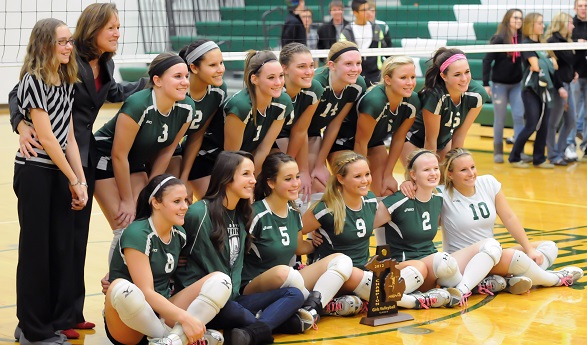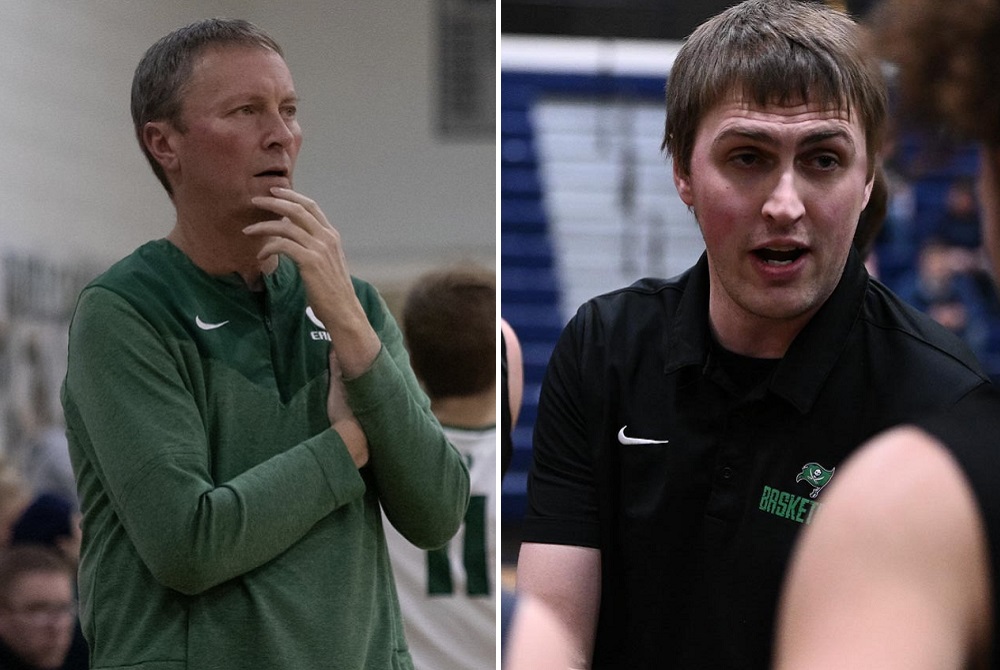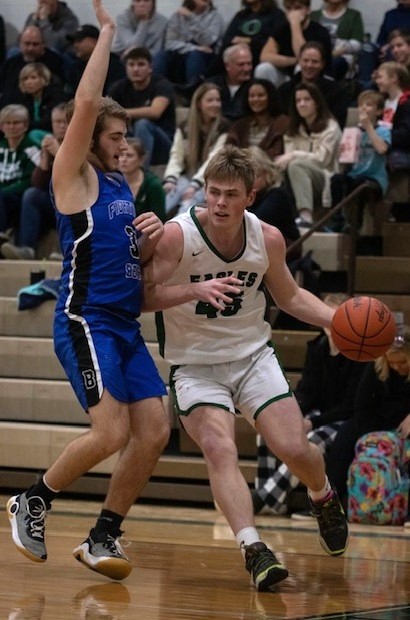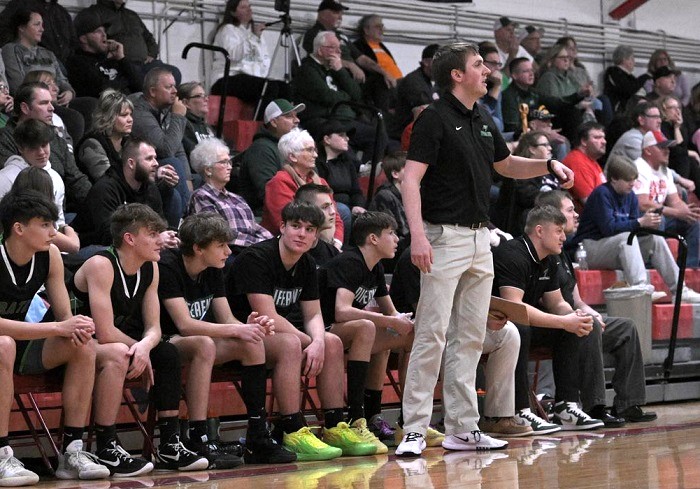
Wise Words for Coaches New (and Old)
September 13, 2013
By Geoff Kimmerly
Second Half editor
Every fall brings a new beginning for those who live by the high school calendar. And among those experiencing a new start are first-year high school coaches eager to begin their careers in educational athletics.
But what knowledge do they bring into their first coaching jobs? Most if not all played at the high school level, and many played at the college level as well. Some have served as assistants or coached youth teams. But high school coaching comes with its own set of challenges requiring an advanced set of skills – skills that are passed on annually as part of the Michigan High School Athletic Association’s Coaches Advancement Program.
To assist in giving some of our new coaches a running start, we tapped into the knowledge of three of our Coaches Advancement Program instructors for advice they give those just starting out:
 Jean LaClair began this fall 12th in MHSAA volleyball history with 861 wins since becoming a varsity head coach in 1987. She’s coached at Midland Dow, Pinconning and currently Bronson, where she’s also the athletic director and an assistant principal. She’s also served as an MHSAA official and contributed to the Women in Sports Leadership porgram.
Jean LaClair began this fall 12th in MHSAA volleyball history with 861 wins since becoming a varsity head coach in 1987. She’s coached at Midland Dow, Pinconning and currently Bronson, where she’s also the athletic director and an assistant principal. She’s also served as an MHSAA official and contributed to the Women in Sports Leadership porgram.
 Ken Semelsberger is a recent inductee into the Michigan High School Football Coaches Hall of Fame and spent 33 years at Port Huron High School as a coach and athletic administrator. He also coached football at Detroit Servite and has led teams in basketball, softball and baseball. Semelsberger returned to the Port Huron sideline four seasons ago as the varsity’s line coach.
Ken Semelsberger is a recent inductee into the Michigan High School Football Coaches Hall of Fame and spent 33 years at Port Huron High School as a coach and athletic administrator. He also coached football at Detroit Servite and has led teams in basketball, softball and baseball. Semelsberger returned to the Port Huron sideline four seasons ago as the varsity’s line coach.
 Penny Allen-Cook currently is an athletic consultant and in her fourth season coaching the Freeland varsity volleyball team. She also coached volleyball at Alma College, and is a former assistant commissioner of the Great Lakes Intercollegiate Athletic Conference. She served as an assistant athletic director at Alma College and director of compliance at Saginaw Valley State University.
Penny Allen-Cook currently is an athletic consultant and in her fourth season coaching the Freeland varsity volleyball team. She also coached volleyball at Alma College, and is a former assistant commissioner of the Great Lakes Intercollegiate Athletic Conference. She served as an assistant athletic director at Alma College and director of compliance at Saginaw Valley State University.
All were asked the following questions during separate interviews. But not surprisingly, some of their answers were similar – especially those that emphasized dealing with parental pressures and why they as coaches continue to return to the sideline every year.
Many of their answers also segued well into each other, so we’ve blended them for one longer conversation filled with wisdom beneficial to new and veteran coaches alike.
What do you tell those who are interested in becoming high school coaches?
Semelsberger: “Basically, it’s one of the most fulfilling things you’ll ever do. And it’s also one of the hardest things you’ll ever do. I try to explain that it’s not just about going to practice and coaching kids today. That’s the easy part. It’s also preparing for practice, (gaining) the knowledge of what to do in certain situations from the game itself all the way to training procedures, injury procedures and liability issues. That’s all part of the coaching realm.”
LaClair: “My biggest concern with young coaches is them getting driven out by parents really early. You’ve got to have thick skin, and you’ve got to have great relationships with parents. You can’t be afraid to talk to parents.”
Allen-Cook: “Certainly to coach is an extremely rewarding thing to do. But you can’t get into it for the money. You get into it for the things that last for a lifetime. My first year I started coaching was back in 1986, and I’ve kept in touch with those kids. (Coaching) can’t be for money or wins and losses, but the differences you make in lives.”
Semelsberger: “Probably not until after the first year do you realize all that’s entailed in coaching. (Coaches) say, ‘Once I really got into and do it, after the first time, it was a lot more than I thought.’ They say, 'What can you tell me to help me?'”
How do you encourage coaches who have become frustrated with the profession?
Allen-Cook: “It’s easier to get discouraged nowadays more than it used to be, and a common thing that discourages is the parent involvement is at a different level than it ever was 20 years ago. The key is to remember, and it’s hard for young coaches who aren't parents, but you tell them to step back and imagine what it feels like if you were the parent.”
LaClair: “I do try to get all young coaches a mentor, someone to talk with. We all get frustrated; we all have to vent, and we need the right person to talk it through with and come up with alternative ways (of dealing with situations).”
Semelsberger: “The one thing I tell them is to remember that what’s most important out there is how they influence athletes. I want to see them doing positive things with our athletes, stressing grades and sportsmanship. I hired a hockey coach once, and I told him to clean up the program. I don’t care if you win; I want our grades to be good, community involvement, and the wins and losses will come. If you stay with it, hang in there, it will come.”
Allen-Cook: “If they approach things the right way, in as few years as four or five, if they stick it out, they’ll learn the positives outweigh the negatives. I’m always encouraging them to stick it out a few more years until they can figure out their true philosophy, why they want to coach.”
What specific situations do you tell new coaches to prepare for, and how?
LaClair: “For me as a coach, the parent/athlete meeting is mandatory. If a parent comes to me with a question during the year, I say, ‘Do you remember the parent/athlete meeting? We discussed that.’ It sets the tone and tells parents how proactive you are as a person, how organized and prepared you are.”
Semelsberger: “When you’re not coaching, when you’re sitting in the stands, the parents are friendly. But once you’re on the sideline, now you’re the coach, and that changes the dynamic of the relationship dramatically. I explain to (coaches) that my philosophy is I’m dealing with parents’ most precious item. You want to treat each one of those children like you’d want your kids to be treated. You don’t have to play everyone all the time, but treat (athletes) with respect, talk to them and let them know what’s going on, why a kid isn't playing, so the kid has an idea what’s going on.”
Allen-Cook: “One of the best defenses is to be a student of whatever the game is they’re coaching so they can be seen as an expert all the time. Show it by going to clinics, reading up on things, and coming to practice with a true plan of what you’re doing every day. Parents are less likely to question if you know what you’re doing and they can see you’re a true student of the game and come every day prepared.”
LaClair: “Time management is critical. Especially for me, you need to have good practice plans, well thought out in advance so kids aren't standing around at all.”
Semelsberger: “Sometimes I tell (coaches) about reporters if the sport has a lot of reporters; always be positive, don’t be negative. ... (Also) I make sure they understand and follow the rules. Academics are the most important thing, so make sure every kid is eligible. And I tell them the most important people are secretaries and custodians. Get them on your side, and they’ll do anything for you.”
What advice do you offer coaches who also are balancing teaching or other jobs at the school?
LaClair: “Just over half of my (teachers are coaches), and that’s great. You can build a different type of relationship.”
Semelsberger: “Their number one job is being a teacher, and that’s always been the number one job. They can’t let the fact they coach take away from that. Classes are number one, and coaching comes after that.”
LaClair: “You have to think days and weeks ahead. I tell coaches who are also teachers that the weekends and a lot of Sundays are going to be for making lesson plans for the week, practice plans for the week. Then all they have to do is tweak them. Have a good plan and all you have to do is tweak, and you don’t have to do that for two hours on a Thursday night.”
Allen-Cook: “It’s a neat experience to be able to teach in other realms (like athletics). Unfortunately there are less and less teacher coaches.”
What keeps you coming back to coaching?
LaClair: “The kids. A lot of people think social media is an evil beast, and it can be. But what I love about it is I've been coaching a long time and I can keep up with former athletes all over the country, see baby pictures, things I wouldn't be able to do without social media.”
Allen-Cook: “I think once you’re a coach, you’re always a coach. It’s tough to get out of your blood. I enjoy the interaction with the young people. I’m an independent contractor now (Allen-Cook also has taught) so I have little interaction with student athletes anymore. It feels rewarding that in some way I’m having a positive impact.”
Semelsberger: “The kids, the athletes, just to watch them develop as human beings. We work hard with on our athletes being leaders in the (school) building; the first day of school our senior and junior football players were helping out the freshmen. If a kid was scared or something, trying to get where they needed to go, we had jerseys on and they knew if they saw a kid with a jersey on they could ask for help. To see those kids take on those roles ... I love watching the ninth graders come in as scared little kids and watch them leave as confident seniors going on to college or work or whatever they’ll do.”

PHOTOS: (Top) Penny Allen-Cook (second from left, back row) and her Freeland volleyball team celebrate last season's Class B District championship. (Click to see more from High School Sports Scene.) (Below) Bronson volleyball coach Jean LaClair speaks with some her players during one of her more than 1,000 games as a varsity head coach. (Photo courtesy of the Sturgis Journal.)

Father & Son Seidl Have Much to Discuss, Notes to Compare From Perfect Starts
By
Doug Donnelly
Special for MHSAA.com
February 7, 2023
Matt and Derek Seidl have a lot to talk about these days.
 The father and son duo both have highly-ranked, undefeated basketball teams going into the first full week of February, something neither of them saw coming.
The father and son duo both have highly-ranked, undefeated basketball teams going into the first full week of February, something neither of them saw coming.
“We were hoping for a season like this, but you never think about winning this many in a row,” said Matt Seidl, the father and head coach of the 15-0 Olivet Eagles. “When our season ended last year, we knew our top seven players would all be returning.”
About 50 miles south of Olivet, in Jackson County, Derek Seidl has the Napoleon Pirates off to a 14-0 start. They are sitting on top of the Cascades Conference.
“We have a really talented group right now,” Derek said. “We were 19-3 last year and brought six guys back. Having that experience has been very valuable.”
Olivet is ranked No. 2 in MPR in Division 2 while Napoleon is No. 9 in Division 3. Both are top-10 teams in the latest Associated Press polls as well.
Matt Seidl, 60, graduated from Ypsilanti Lincoln High School in 1981 and went to Eastern Michigan University to become a sportswriter. He didn’t begin teaching until he was in his early 30s, but, by then, was already a veteran coach.
“It was getting difficult because I was always leaving my job to go coach,” he said. “I decided to go and get my teaching degree.”
He wound up in the classroom, which enabled him to dive deeper into coaching. He spent several years coaching at the middle school and high school levels, boys and girls, with stops at places like Pinckney, Ypsilanti, Manchester, Willow Run and Romulus. He was the JV boys basketball coach at Dexter when his son, Derek, made the team as a freshman.
 By then, Derek already knew he would be on the bench one day as a coach.
By then, Derek already knew he would be on the bench one day as a coach.
“I played for my dad in youth travel stuff, and he was on staff for one year my freshmen year of high school,” Derek said. “He was a varsity coach all growing up. I was always at games. I loved talking to him about the game, the strategy of it, the Xs and Os. Even when I was younger, I thought about coaching someday. Growing up if you would have asked me what my dream job was, it would have been a teacher and coach.”
Derek, 27, graduated from Dexter in 2014. He played four years of college basketball at Lawrence Tech University. After getting his master’s degree and teaching degree, he got his first coaching job as an assistant coach at Chelsea, under Josh Tropea, who also had coached with Matt.
Derek’s first teaching and head coaching job came at Springport in 2019-20. This is his third year at Napoleon.
“It’s been a really good fit here,” Derek said. “Before I started looking into the job, I barely knew anything about Napoleon. It has worked out well.”
Matt is also the athletic director at Olivet. If he would have had his way, Derek would be coaching at Olivet.
“Derek did a really good job at Springport, and we had an opening and he interviewed and was recommended for the job, but before they offered it to him, Napoleon hired him,” Matt said. “He would have been the perfect choice to teach math and coach basketball.”
With Derek no longer in the running, Matt came out of coaching retirement and was named head coach.
“It was going to be a one-year deal, sort of a band-aid to get us to the next year,” he said.
Instead, Matt’s stayed on and put together quite a successful team. The Eagles have gone 47-6 since the start of the 2020-21 season. This year’s team has taken a big step.
Junior Bo Lincoln, a 5-foot-11 junior point guard, leads the team in scoring (17.1 points per game), assists (3.6 per game), steals (3.0 per game) and free throw percentage at 78 percent.
Drew Priddy, a 6-5 senior center, is averaging about eight points and seven rebounds a game, and junior guard Bryce Wine is averaging nine points a game and leads the team in 3-pointers.
“We had quite the youth movement a few years ago,” Matt said. “We go 8-9 deep now and have a lot of experience. Having those young guys play a couple years ago is paying off.
“We are a good team, but we’re not a 70-possessions-a-game type of team. We know who we are.”
 Derek also knows plenty about his dad’s team.
Derek also knows plenty about his dad’s team.
“I definitely keep track of them,” he said. “We talk on the phone on a daily basis – 30 minutes about Napoleon and 30 minutes about Olivet. We bounce things off each other. We run a lot of the same stuff as far as systems. We’re very connected on things.”
Matt and Derek’s teams tried to have a good old-fashioned scrimmage, or exhibition, last year but – with Derek’s team ahead – Matt received two technicals and got kicked out of the game. It’s a fun story for both to tell now.
“That was wild,” Derek said. “It was a cool thing we had going. We were winning so I was enjoying it, but that put a whole different spin on the situation.”
Matt said they probably won’t do that again. Probably.
“My wife said no,” he said. “Derek and I have talked about it, but I don’t know that it would ever happen.”
Derek said one day he’d like to coach with his father.
“I’m very energetic and into it, just like he is,” Derek said. “There are some similarities. I played for him and watched him a lot. I try and pull some of the things he does, being prepared. We get along super well. I don’t know if I could trust him to not get technical fouls.”
He’s kidding, of course.
Napoleon has a core group of four players with a ton of experience.
Devonta Habern is a 5-11 junior who is on the varsity for the third year and runs the show at point guard. Six-foot-5 senior Trent Jester is one of the best big men in the conference. University of Michigan baseball commit Grant Bradley is a three-year varsity starter and outstanding athlete. Holden Vanpoppel is an all-state track athlete who has turned into a pretty good basketball player.
“Grant is super steady and having a great year,” Derek said. “He looks like he’s been in the weight room since he was 5 years old. He can guard anybody. Vanpoppel is an unbelievable run and jump athlete. All four of these guys are averaging in double figures. They are really good athletes who have invested in the program and put the time in.”
“We’ve got a very talented group,” Derek said. “They are a little looser than I am. I tend to be very calculated, kind of analytical and serious. They like to goof around a little bit. They keep me even-keeled. They know when to get serious. It’s good for me to have a group like that.”
Derek said his squad wants to exceed expectations this year.
“We talk about that after every game – don’t be satisfied just because we are undefeated,” Derek said. “There is plenty more to accomplish. Last year we went 18-2 in the regular season and 19-3 overall, but we didn’t win a league or a District. Our guys have bought into that mindset. That’s helped us get to where we are.”
Matt is keeping a close eye on not only his team, but Derek’s as well.
“I probably get more stressed watching his games,” he said. “I’m really proud of what he has been able to do.”
 Doug Donnelly has served as a sports and news reporter and city editor over 25 years, writing for the Daily Chief-Union in Upper Sandusky, Ohio from 1992-1995, the Monroe Evening News from 1995-2012 and the Adrian Daily Telegram since 2013. He's also written a book on high school basketball in Monroe County and compiles record books for various schools in southeast Michigan. E-mail him at [email protected] with story ideas for Jackson, Washtenaw, Hillsdale, Lenawee and Monroe counties.
Doug Donnelly has served as a sports and news reporter and city editor over 25 years, writing for the Daily Chief-Union in Upper Sandusky, Ohio from 1992-1995, the Monroe Evening News from 1995-2012 and the Adrian Daily Telegram since 2013. He's also written a book on high school basketball in Monroe County and compiles record books for various schools in southeast Michigan. E-mail him at [email protected] with story ideas for Jackson, Washtenaw, Hillsdale, Lenawee and Monroe counties.
PHOTOS (Top) Father Matt, left, and son Derek Seidl are leading undefeated boys basketball teams this season at Olivet and Napoleon, respectively. (Middle) Senior Brayden Wine makes a move toward the basket for the Eagles. (Below) Derek Seidl instructs his players. (Olivet photos courtesy of Olivet High School; Napoleon photos by Jeff Steers/JTV.)

